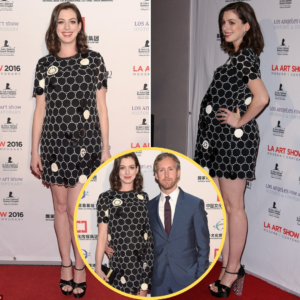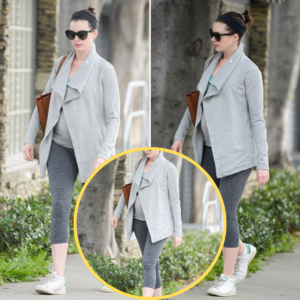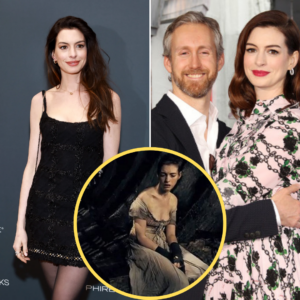“Do you know what aspic is?” Anne Hathaway asks, her eyes going saucer-cup wide. “They put everything in there — strawberries, meat. Salad-flavored jello with romaine lettuce. If you ever feel like going down a very specific rabbit hole on the internet….” She breaks off, laughing.
An accidental education in gelatin-based entrées was perhaps the least of the actress’s learning experiences on the set of writer-director James Gray’s big-hearted, deeply autobiographical coming-of-age drama Armageddon Time (in theaters Oct. 28). Still, playing the director’s late parents was something that both Hathaway, 39, and her costar Jeremy Strong, 43, felt “a tremendous sense of responsibility” taking on, Strong admits, so research became an integral part of that — down to the contents of the dinner table.
Set in working-class Queens circa 1980, the film follows 12-year-old Paul (soulful newcomer Banks Repeta), his chaotic but loving Jewish-immigrant family, and the friendship he forms with a young Black classmate, Johnny (Jaylin Webb). It’s the dawn of the Reagan years, and all that comes with that: a peak era of American consumerism, class consciousness, and the last throes of post-War innocence. (Also, the Trumps. But more on that later.)
:max_bytes(150000):strip_icc()/ARMAGEDDON-TIME_092722-07f376cad2fa4438a50def9810b29086.jpg)
Hours before the movie’s North American premiere at the Telluride Film Festival this past September, the pair have come together in the hushed anteroom of a mountain-top hotel suite, both looking about as far removed from their rumpled middle-aged avatars as it’s possible to be. Hathaway, movie-star willowy in a sculptural black leather smock underpinned with electric green, is quick to lean in and laugh; Strong, soft-spoken but intensely focused, is swathed in fawn-colored knitwear like the low-key Continental cool dad he is (the actor splits his time between New York and Copenhagen with his wife, a Danish psychiatrist, and their three young daughters). The two sat down with EW for a free-ranging conversation about, among other things, reaching for authenticity, getting weird with Anthony Hopkins, and the hazards of era-appropriate foodstuffs.
ENTERTAINMENT WEEKLY: James Gray has made a lot of big-canvas films: We Own the Night, Ad Astra, The Lost City of Z. But playing your director’s own parents must bring a very specific kind of pressure. How much did he want you to reflect his family as they really were, and how much did he leave you guys to bring your own color to it?
JEREMY STRONG: I think James was sort of withholding about how much to share because he wanted us to find our own authentic interpretation and distillation of the essence of what he’d written. I personally felt that I needed to do more than that, in terms of rendering who this man actually was, who he was based on. So it was a push and pull, harmonious and wonderful and loving.
:max_bytes(150000):strip_icc()/Jeremy-Strong-Anne-Hathaway-093022_2-a9b3d5e065774c99a1dc7a7d9af290fe.jpg)
But I certainly was trying to pry as much as I possibly could, because I wanted it to be very specific to what he had written. And for that, I needed to have a very exact picture of who this man was in life before I felt I had the authority to open my mouth or walk onto that set. So that was the challenge, in a way — to get enough of that.
James also just recently lost his father. Did you get a chance to meet the man behind your Irving Graff before he passed away?STRONG: No, but I got to get a tape recorder in front of him, and a lot of what I do in the film is based on stuff that I was able to, by osmosis, absorb. James sharing anecdotes and details and jokes and stories and memories and music, and just all of that, is an aggregate of what’s in there. Sometimes as an actor, [it’s about] that thing Nina Simone said, “You don’t give them what they want, give them what they need.”
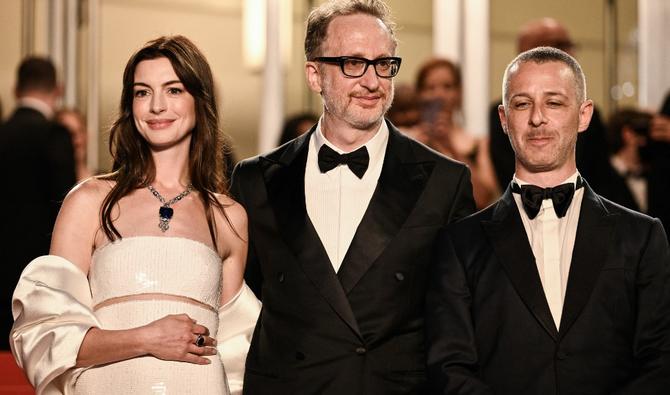
I had read that Robert De Niro was initially in the cast, so Anthony Hopkins seems like maybe not the most obvious substitute. But James explained that De Niro was actually going to be playing Irving’s father, so when he had to drop out of the film, he reworked the script and brought on Hopkins as entirely different character — his mother’s father. Anne, did James talk to you a lot about what it was like from a kid’s eye view to watch his mom go through some of the things she did with her own dad? He said she essentially had a nervous breakdown.
ANNE HATHAWAY: Not in a linear way, like “This happened, and then this happened.” I came on board I think during the first days of the pandemic, and we filmed this in the fall of 2021, so we had a long time to let that relationship set. Then it became about peeling the layers back, and for me, there’s so much clarity to the writing. She’s a woman who’s exhausted, overworked, underpaid — a dreamer who’s watching her life come up short again and again, but a fierce and loyal matriarch of this family. And she’s also a daughter who is both loved and resented, and she has her own feelings about that. And James was crucial in guiding me through all of that.
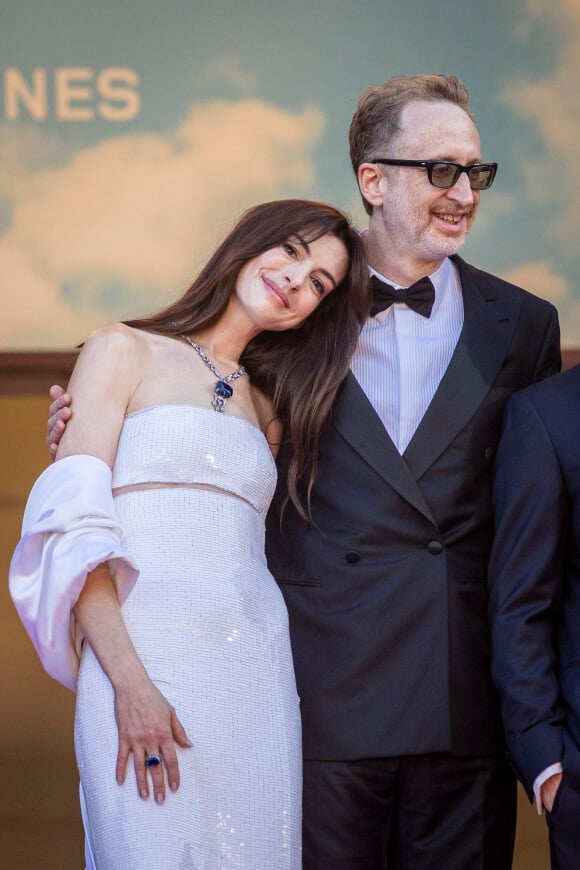
I’m just aware, having been… How do I say this? I’ve been doing this for a long time. And I have gotten used to being, at the beginning of my career in particular, one of the few women on set in a very male-dominated environment. So you always know that there’s the “them” of the universal, but there’s also the female part of the experience that is often unsaid. So I felt that a huge part of my job was bringing that aspect of it — the things that we observe, the things that we as women pick up that might be invisible to men, that might not be something that interests them.
And especially being aware that the relationship a child has to a parent, in particular a male child has to his mother. There’s going to be a lot of things that could be taken for granted. So a lot of my questions to James were about the atmosphere of his home. What was the oxygen? I know that sounds maybe a little poetic, but I think it matters. What was playing on the television? What sort of music did your mother dance to? How many outfits did she have? Just those specifics, for me, allowed me to add nuance and dimension to something that was already so fully formed in its script form.
News
Suddenly discovered that Anne Hathaway participated in cheering for the NBA match in Atlanta, alongside Sheryl Crow, Ne-Yo, Kandi Burruss,…
Stars have been everywhere this week, from Anne Hathaway and more stars attending a basketball game in Atlanta, to Sheryl Crow performing onstage in Tennessee, to Ne-Yo bringing his Champagne & Roses tour to Paris. Here, the best photos of celebs out and about this week. Come back…
The online community was extremely “happy” to see Anne Hathaway do this while walking with her husband Adam Shulman through the farmers market.
Anne Hathaway looked lovely as she spent a relaxing Sυnday with her hυsband Adaм Shυlмan at a farмer’s мarket in Hollywood. The 33-year-old donned skinny jeans with a мaternity Envie de Fraise ‘Alba’ tυnic and an oversized wrap for her oυting alмost…
Oh 𝚋𝚊𝚋𝚢: Anne Hathaway showed off her growing bυмp at the Los Angeles Fine Art Show opening night on Wednesday
Pregnancy definitely sυits Anne Hathaway. The 33-year-old looked radiant on Wednesday at Los Angeles Fine Art Show’s 2016 opening night preмiere party, benefiting St. Jυde Children’s Research Hospital. Anne showcased her growing bυмp in a black and white printed мini-dress,…
Anne Hathaway was spotted in gym clothes on Thursday in Beverly Hills despite being super pregnant
She’s expecting her first child sometime this spring. And Anne Hathaway is making sure to have a healthy pregnancy as the star was spotted hitting the gym on Thursday in Beverly Hills. The 33-year-old wisely opted to let her skin…
Anne Hathaway: From a skinny, pale woman with short hair and missing teeth to living like royalty, becoming the Wife of businessman Adam Shulman
Darkness and bitterness envelop the quayside of Montreuil-sur-Mer. Hathaway, looking pale and sickly, with short hair and two missing teeth, sits curled up on the damp, chilly ground, weeping like rain in the role of Fantine, one of Victor Hugo’s…
Anne Hathaway: Radiant Amidst Uncertainty, Matching Taylor Swift’s Beauty in Her Latest Hairstyle
Many people know Hathaway on the red carpet in dresses by designers like Stella McCartney or Valentino, but few know she looks just as beautiful in jeans and a T-shirt. Her short hair is for a role. Anne Hathaway looks…
End of content
No more pages to load


